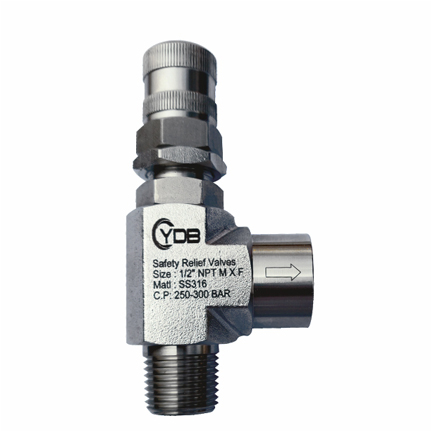Safety Relief Valve
FEATURES
- Compact design, Angle pattern.
- Cracking pressure are adjustable externally.
- Prevents over pressure.
- Unaffected by vibration.
- Stainless steel Body and internal parts.
- Excellent repeatability.
- Set pressure tolerance of ± 3%.
- End Connection Sizes: 1/4” to 1” (SW, BSP, NPT, BSPT Female Thread).

OPERATING PARAMETERS
| Low Pressure Valves | cracking pressure adjustable from 10 – 550 psi |
| High Pressure Valves | cracking pressure adjustable from 150 psi – 6000 psi |
| Temperature Rating | PTFE: -65° F to 450°F ( -50°C to 232°C) |
| Oring: -4°F to 400°F ( -20°C to 204°C) |
Safety Relief Valve
YDB Valves is the supplier and leading safety valve manufacturer in India. We manufacture safety valves with utmost precision and they also undergo stringent quality checks before they are delivered to the clients. Our products are tailored to meet your requirements thoroughly.
FAQs
How does a safety relief valve work?
The safety relief valve is specifically designed to open at the present pressure and then discharge fluid and till pressure reduces to acceptable levels.
What is the purpose of a safety relief valve?
The main purpose of a safety relief valve is the protection of property, life, and the environment.
What is difference between safety valve and relief valve?
Safety valves open very quickly and completely to avoid a disaster rather than controlling the pressure of a system. But a relief valve controls the pressure in a system and is opened in proportion as per the pressure increase in the system.
here is the safety relief valve usually located?
A safety relief valve is located in the tank from where it will receive air from the compressor.
How many types of safety valves are there?
Two types of safety valves exist and their diaphragm and piston type.
What is the most common use of a safety valve?
Safety valves are very commonly used on pressure cookers.
Who invented safety valve?
Denis Papin invented the first safety valve
